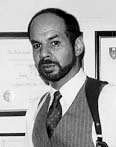
Jim Kouri
Court of Appeals: Airport body scanning not unconstitutional
By Jim Kouri
The full-body scanning machines used at airport security checkpoints by the Transportation Security Administration security officers are not unconstitutional, according to a federal court ruling on Friday.
The Electronic Privacy Information Center, a public-interest group, and individual plaintiffs had argued before the Washington, D.C., Circuit of the U.S. Court of Appeals that the airports' use of "advanced imaging technology" is an infringement on citizens' Fourth Amendment right to be protected from unreasonable searches and seizures. The court ruled Friday that it disagreed with the plaintiffs.
"In view of the Supreme Court's 'repeated refusal to declare that only the least intrusive search practicable can be reasonable under the Fourth Amendment,' and considering the measures taken by the TSA to safeguard personal privacy, we hold AIT screening does not violate the Fourth Amendment," the three-judge panel stated.
"As other circuits have held, and as the Supreme Court has strongly suggested, screening passengers at an airport is an "administrative search" because the primary goal is not to determine whether any passenger has committed a crime but rather to protect the public from a terrorist attack," the ruling continued.
Meanwhile, House Oversight and Government Reform Subcommittee on National Security, Homeland Defense and Foreign Operations called a hearing on Wednesday to investigate airport security after reports showed there had been 25,000 breaches of security checkpoints since November 2001.
Subcommittee Chairman Jason Chaffetz (R-Utah), a frequent critic of the TSA, complained about the security breaches and called them "unacceptable."
"We appreciate TSA in tracking and providing that data, but obviously, those are the ones we know about," Rep. Chaffetz said at the start of Wednesday's hearings. "The deep concern is, what about the ones we don't know about?"
Chaffetz added that he was concerned that the TSA had not conducted threat-vulnerability assessments of most U.S. airports. Only about 20 of the more than 450 airports for which the TSA is responsible for security have been reviewed by the Homeland Security Department.
© Jim Kouri
July 18, 2011
The full-body scanning machines used at airport security checkpoints by the Transportation Security Administration security officers are not unconstitutional, according to a federal court ruling on Friday.
The Electronic Privacy Information Center, a public-interest group, and individual plaintiffs had argued before the Washington, D.C., Circuit of the U.S. Court of Appeals that the airports' use of "advanced imaging technology" is an infringement on citizens' Fourth Amendment right to be protected from unreasonable searches and seizures. The court ruled Friday that it disagreed with the plaintiffs.
"In view of the Supreme Court's 'repeated refusal to declare that only the least intrusive search practicable can be reasonable under the Fourth Amendment,' and considering the measures taken by the TSA to safeguard personal privacy, we hold AIT screening does not violate the Fourth Amendment," the three-judge panel stated.
"As other circuits have held, and as the Supreme Court has strongly suggested, screening passengers at an airport is an "administrative search" because the primary goal is not to determine whether any passenger has committed a crime but rather to protect the public from a terrorist attack," the ruling continued.
Meanwhile, House Oversight and Government Reform Subcommittee on National Security, Homeland Defense and Foreign Operations called a hearing on Wednesday to investigate airport security after reports showed there had been 25,000 breaches of security checkpoints since November 2001.
Subcommittee Chairman Jason Chaffetz (R-Utah), a frequent critic of the TSA, complained about the security breaches and called them "unacceptable."
"We appreciate TSA in tracking and providing that data, but obviously, those are the ones we know about," Rep. Chaffetz said at the start of Wednesday's hearings. "The deep concern is, what about the ones we don't know about?"
Chaffetz added that he was concerned that the TSA had not conducted threat-vulnerability assessments of most U.S. airports. Only about 20 of the more than 450 airports for which the TSA is responsible for security have been reviewed by the Homeland Security Department.
© Jim Kouri
The views expressed by RenewAmerica columnists are their own and do not necessarily reflect the position of RenewAmerica or its affiliates.
(See RenewAmerica's publishing standards.)




















